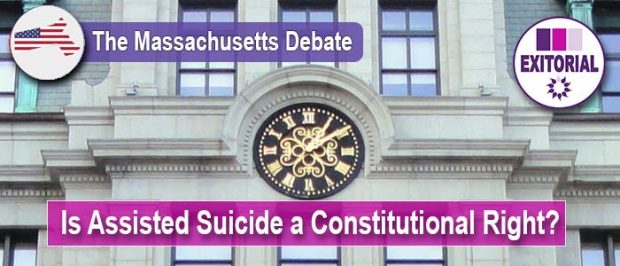March 12, 2022
Exitorial – is assisted suicide a Constitutional right?
Exitorial – is assisted suicide a Constitutional right?
Last week the Massachusetts Supreme Court began hearing a case where one doctor (Alan Steinbach) is seeking to assist another (who is terminally ill with prostate cancer), Roger Kligler, in the absence of any medical aid in dying law.
This is an interesting case because the parties are asking whether the ill doctor, Roger Kligler, has a constitutional right to an assisted suicide in the face of inevitable suffering.,
This is rather than the legislature/ parliament of the State of Massachusetts passing an end of life choices law, as has happened in a handful of other US states, such as California.
The situation is interesting not because most of the Justices of the Court are making sympathetic noises about Kliger’s right to end his suffering: but because they seem to be saying that the State should have no role in stopping him ending his life (and suffering) if that is what he wishes.
The discussion is centering around the concepts of personal liberty and privacy.
This case is echoing the approach of the German and Austrian Constitutional Courts in early 2020 when they confirmed the constitutional ‘right of personality’ in regards to assisted suicide.
These Courts ruled that an expression of personal autonomy, includes a right to self-determined death. And that the associated freedom to take one’s own life in a self-determined way, also includes the freedom to seek help from third parties.
In all of these cases, however, the Courts are involving the medical profession and this is where the approach falls down as far as Exit is concerned.
If the medical profession are called in as the gate-keepers, the power conferred is immediately shifted from the patient, to the doctor.
Not only must the person asking for the assistance be ill (usually terminally), but the right in play is the right to ask, it is not the right to receive or to do oneself.
Massachusett’s Justice, Dalila Wendlandt, said in Court this week “[w]e’re moving forward”.
“Why isn’t it time to recognize that patients … have a right to decide in their own way, on their own terms, how they want to die as opposed to waiting?”
The language is noteworthy.
The discussion is not about people or citizens deciding ‘their own way’.
Rather, the ‘people’ have become ‘patients’.
The Constitutional right being debated is relational.
It is the right of patients to ask their doctors to help them and for the doctors to respond.
In summary, it is a positive move for this case to have been brought to the Massachusetts Supreme Court.
But the logic is not there.
This was nowhere more obvious than when Justice Georges suggested that the Euthanasia Prevention Coalition were being ‘paternalistic’.
Be that as it may, it is also the medical profession that has a long history of paternalism, with ‘doctor knows best’.
This is not to say there are no good doctors who reject the pedastall their occupation has placed them on.
But to charge a profession with the regulation of who can, and who cannot, ask for help for a good death (it is they who determine who is ‘sick enough’), is to give them with an authority that one human being should only ever have over another in the most special (and in minimum) of circumstances.
The nature and number of permissions that a seriously ill or very old person with decision-making capacity must obtain should be kept to the absolute minimum.
The Swiss model of needing to 1. have mental capacity and 2. do the action (that brings about death) yourself is the perfect minimum.
The Massachusetts Supreme Court has the opportunity to open the debate in significant ways.
A constitutional right to assisted suicide but only if you are terminally ill makes neither common sense nor legal sense.
Let us hope they consider also this point.
